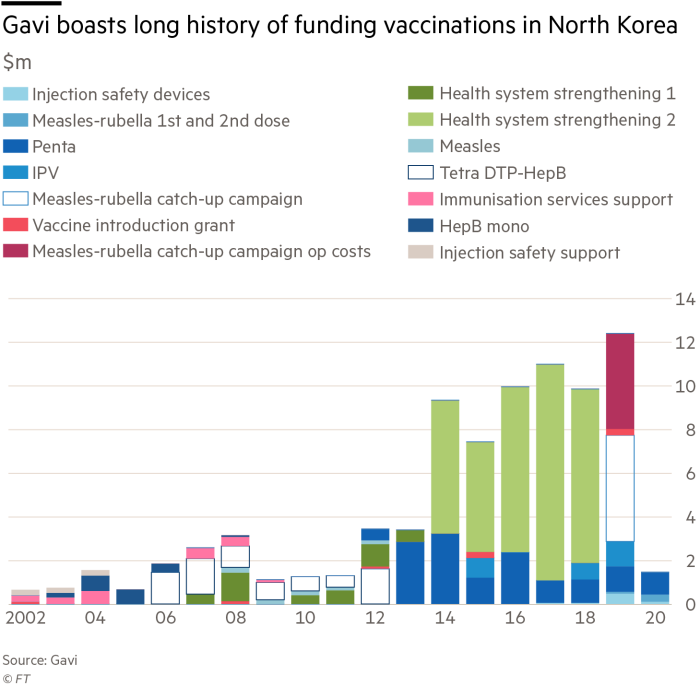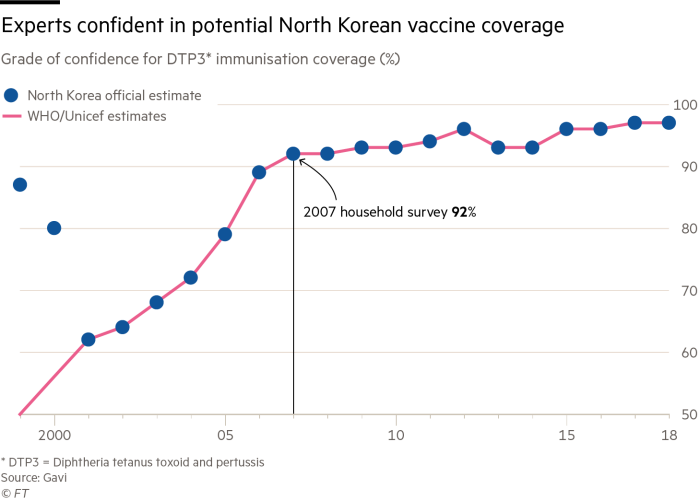
[ad_1]
The doctrine of juche, or self-reliance, has served as a guiding principle for North Korea’s ruling Kim dynasty for more than seven decades as it kept its people isolated from the outside world.
But Kim Jong Un must decide whether to accept offers of international assistance to overcome the unprecedented health threat posed by coronavirus. The 37-year-old dictator’s choice will have consequences for the international community’s fight to end the global pandemic, with fears that Mr Kim’s security concerns could stand in the way of efforts to inoculate the 25m people under his rule.
“The nuclear and missile developments over the last couple of years have demonstrated just how willing they are to sacrifice the wellbeing and prosperity of their own people for their own security,” said Peter Ward, a Seoul-based North Korea expert at Vienna University.
North Korea has signalled its interest in participating in the Covax programme, which is seeking to ensure equitable vaccine access around the world, according to people familiar with the matter.
International medical experts who have worked in North Korea see this as a positive sign that Pyongyang might be willing to accept aid from Gavi, the UN-backed vaccine alliance that has nearly 20 years’ experience working in the country. The organisation is leading the Covax initiative alongside the World Health Organization and the Coalition for Epidemic Preparedness Innovations.
A critical question hinges on the level of foreign assistance required to facilitate an inoculation programme.
International staff would need to enter North Korea to run initial assessments and support logistical challenges posed by distributing the vaccine across one of the world’s poorest and least-developed countries. They would also be required to train local staff and then, under Gavi’s rules, monitor the inoculation programme.

North Korea instituted a sweeping lockdown of cross-border and internal movement in January. While it has not publicly confirmed any coronavirus cases, the measures have also led to most foreigners previously based in the country — including diplomats and aid workers — to depart.
Ramon Pacheco Pardo, a North Korea expert at King’s College London, said “monitoring could be an issue” given how few foreigners are in the country, despite Pyongyang’s longstanding working relationship with the WHO, Gavi and other NGOs.
“If North Korea is not willing to allow the WHO or Gavi to monitor distribution of the vaccine, it would probably be at the back of the queue considering that all countries across the world want to receive the vaccine as well,” he said.
Kee Park, a lecturer at Harvard Medical School who has worked inside North Korea, was confident Pyongyang could institute a conservative quarantine period with additional testing. This would mean international aid workers would be able to enter the country “in a way that is not a significant risk to the population”.
“I think they can find a path to reopen partially, to at least allow the vaccination project to proceed,” he said.
North Korea’s healthcare system is relatively well prepared to support vaccine storage and distribution despite being underfunded and poorly-resourced in many other areas, according to analysts.
This is a legacy of smaller-scale international efforts to battle diseases such as tuberculosis and hepatitis, as well as infant immunisation programmes.

Nagi Shafik, a former manager at the WHO office in Pyongyang, said that North Korea could handle the Oxford/AstraZeneca vaccine, which can be stored at between 2C and 8C.
“The cold chain storage system has been working for a long time . . . I can tell you with confidence that they have a high coverage rate, and they maintain it,” said Mr Shafik, who last worked in Pyongyang in mid-2019 and noted that Gavi data supported his claims.
But the extra-cold temperatures required to store the Moderna and BioNTech/Pfizer vaccines would not be suitable.
Harvard’s Dr Park added that risk-averse North Korean health officials are unlikely to trust vaccines produced in Russia or China until there is more transparency over the jabs’ success rates.
The border closures have battered trade between North Korea and China, straining the cash-strapped economy and slowing deliveries of medical equipment and resources. The economic crisis has heaped pressure on Mr Kim to act.
But a resurgence of cases in the neighbouring Chinese provinces of Liaoning and Jilin has renewed the risk of loosening North Korea’s entry restrictions. Tens of millions of people have been placed under lockdown in China in recent weeks and mass testing has been enforced to root out infections. Underlining the speed at which the virus can spread, officials in Jilin said more than 100 cases had been linked to a travelling salesman.
The North Korean leader’s predicament has come as richer countries face stinging criticism for failing to support poorer nations in accessing Covid-19 vaccines.
Health experts have also called for sanctions on Pyongyang, imposed in response to its nuclear weapons programme, to be eased. They say the measures threaten to slow vaccine rollouts, and that fears over medicine hoarding for the benefit of the military or elites close to the Kim regime are overblown.
“We have to separate the political issue from the scientific; science says that nobody will be immune until everybody is vaccinated . . . this is a human thing, we cannot punish people,” Mr Shafik said.
[ad_2]
Source link